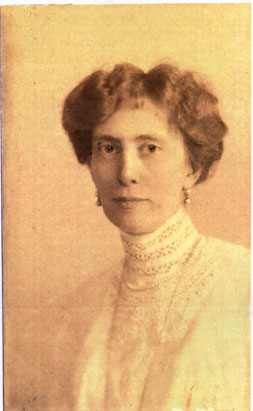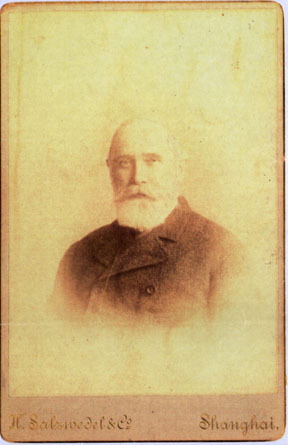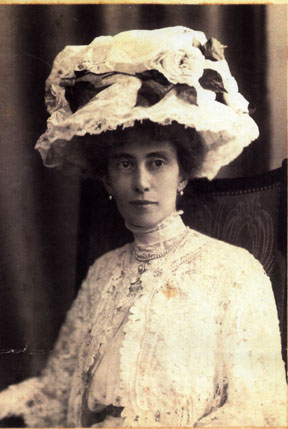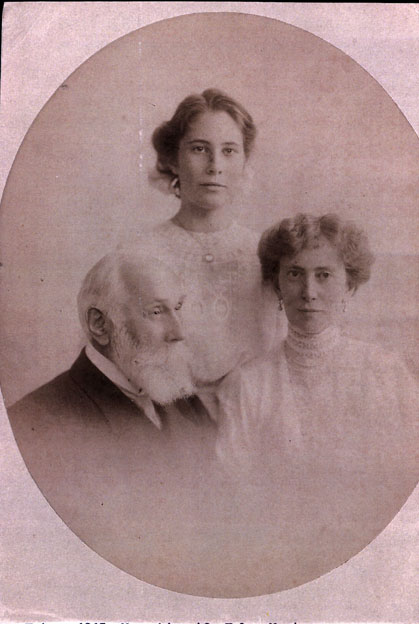


 |  |  | Preface |
 |
| Augustine Heard |
Augustine Heard served as the U.S. Minister/General Consul to Korea from July 1890 through 1893. He was appointed to the position by James G. Blaine, Benjamin Harrison's Secretary of State. In a letter in 1889 to Russell Gray, AH admits that the appointment almost certainly resulted from Blaine's interest in Amy Heard Gray rather than Blaine's interest in him. Amy's connection with the Blaines goes back at least to 1881, when Mrs. James G. Blaine mentions[1] hearing Amy's sister Max
 |
| Helen Maxima Heard |
sing at the the Outreys, the family of the French Minister Plenipotentiary (the equivalent of an ambassador to a backwater like the U.S.). The friendship is likely much older, however, as the parents of Mrs. Blaine, the former Harriet Bailey Stanwood, lived in Ipswich, Massachusetts, before moving to Maine. Hence they likely knew the Heards, one of the most prominent families of Ipswich. Blaine himself was one of the most famous politicians of his day. After marrying Harriet, he moved back to Maine with her and began a career as a newspaper man and politician. He was a founder of the Republican party and served in congress from 1863 through 1876, serving as speaker for much of the time. In 1876 he was appointed to the senate, where he served until 1881. He sought the Republican presidential nomination in 1876, but lost to Rutherford B. Hayes, largely due to the taint of a railroad graft scandal that was to haunt him throughout his career. He tried again in 1880, but lost to James A. Garfield. He became Garfield's secretary of state, but resigned in 1881 when Garfield was shot. Nominated for president in 1884, he lost to Grover Cleaveland. In 1888 he refused candidacy and helped Benjamin Harrison get nominated. When Harrison won, Blaine again became Secretary of State: 1889-1892.
In 1889 Amy wrote to her friend Mrs. Blaine asking her to urge her husband to "do something" for AH. Blaine was disposed to help, but wished to know what sort of thing AH had in mind. AH traveled to Washington to discuss the matter, and after being somewhat put off finally spoke with Blaine. What transpired seems to be that AH requested the position of minister to China, but Blaine refused observing that China was the most important position in all of Asia and required a seasoned diplomat. He offerred instead a position as Consul in Hong Kong or China, but AH seemed to think a Consular position beneath him. Given his financial hardship at the time, his failed business, and his complete lack of experience outside the business world, this suggests that AH might not have been an easy personality to deal with. His letters generally indicate constant depression and unhappiness. Blaine then asked AH if he knew anything of "Corea," to which AH replied he did not. Blaine offerred him the position as Minister and General Consul. AH was again reluctant, but after considering and discussing the matter for a few days accepted. His letters thereafter give full and grateful credit for Amy's assistance in gaining the post.
AH served in Korea from July 1890 through his resignation in March 1893 during the rule of King Kojong during a time of much intrigue and political maneuvering among China, Japan, the European states, Russia, and the U.S. for influence in Korea. Kojong, also called Li Hsi or Li Hi, came indirectly to the throne at the age of twelve when in 1864 King Ch'olchong died without an heir and his widow adopted the young boy with royal blood, and placed him on the throne. His father, Prince Yi Hungson, became regent with the title "Taewongun" or Prince Parent. The Taewongun despised foreigners and would continually cause trouble and foment revolution for the remainder of his life[5]. Kojong assumed real power when he came of age in 1873. He remained King until 1897 when he became emperor until his death in 1907.
 |
| Maximilian von Brandt |
Kojong proved to be weak and passive, but kind and courteous and deeply religious. In contrast, his wife, Queen Min Myongsong, had a strong personality and assisted her husband in escaping the influence of the Taewongun. She, too, would cause great controversy during her career and would finally die at the hands of Japanese assassins. Her family, the Min, exerted strong influence in the Korean government during Heard's tenure.
Korea was then officially newly independent of China, but China viewed her as a "vassle state" while the Western nations tried to encourage her to act independently. In the midst of all of this Japan was preparing an invasion of Korea, which occurred after AH's departure and the occupation lasted until the end of World War II. While in Korea AH's daughter Max wrote Amy regularly, describing the difficulties of life in Seoul. The mail was picked up and received roughly every ten days, so that many of the letters show the stress of last minute writing to catch the mail before it left. Her father wrote the state department often and he is quoted often in Balance of Intrigue: International Rivalry in Korea and Manchuria 1884-1899, by G. A. Lensen[5]. Max's letters describe ordinary life among the European diplomatic community, as well as visits to meet the royal family and a tour of China. Her romance with Maximillian August von Brandt, the German minister to China, is described in some detail. Brandt was 32 years her senior, but he is transformed from an elegant importunate old man to a gentle and passionate lover as time progresses. They married in Seoul against the Kaiser's wishes, so Brandt was sacked and recalled to Germany, whither Max went with him. In a long letter in May 1893 from the Oldenburg in the Malacca straits Max described her marriage in detail and lists her wedding presents. When they returned to Germany Brandt wrote books and the two became the equivalent of local nobility. They had one child, Elizabeth,

|  |
| Max Heard in 1908 in Weimar | Max, Max, and Elizabeth (age 15) |
| in Weimar, 1913 | |
who later married Alexander von Shimpff, a journalist and reservist in the German Army. He was called up and sent to Africa with Rommel, where he was eventually captured and sent to a POW camp in Virginia. I met his son, Peter Alexander von Shimpff in Frankfurt in 1997. The photos of Max and Max were obtained from him.
This is a work in progress, and that progress is slow. I hope to steadily transcribe and translate the letters and provide background information for the intriguing romance portrayed in the letters.
Letters in French are transcribed directly, with only obvious (to me) faults corrected. Max's French was not perfect, but it was generally pretty good so I have usually left it alone. French words interlaced in the English letters have been left alone, and French expressions that are common in English are left alone in the translated French letters. Question marks denote words or phrases I was not able to decipher or about which I had serious doubts.
Perhaps the most difficult aspect of this project has been to decipher the handwriting of my great grandfather Augustine Heard, whose handwriting has to be the most illegible I have ever encountered. He admits the problem and blames it on illness, but he seemed to do little to remedy it. Many words are abbreviated and run together, i's are only occasionally dotted and t's crossed, and words are run together. Punctuation is often lacking and entire phrases seem to be only undulating wiggles, with no distinguishible letters within them. Perhaps this provides the primary connection with my profession, which is strongly involved with pattern recognition. I think I can safely say that such transcriptions are well beyond the capabilities of the most powerful modern computers, and that is unlikely to change in the next few decades.
AcknowledgementsI am indebted to many individuals who have provided me with information, articles, and photographs after they chanced on my Website and contacted me. In particular I gratefully acknowledge the many historical tidbits and photos provided by Robert Neff, who is writing a book on Korean history in the second half of the nineteenth century, John Shufelt, who is writing a book on General LeGendre and who kindly brought to my attention the work of Harold Joyce Noble (1903-1953) and provided me a copy of his own notes on Noble's papers, and Jean Brown, who provided me with information on Clarence Greathouse and his mother Elizabeth. Such new contacts as these have added to the fun of editing these letters and exploring their contents.
 |  |  | Preface |